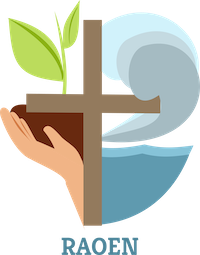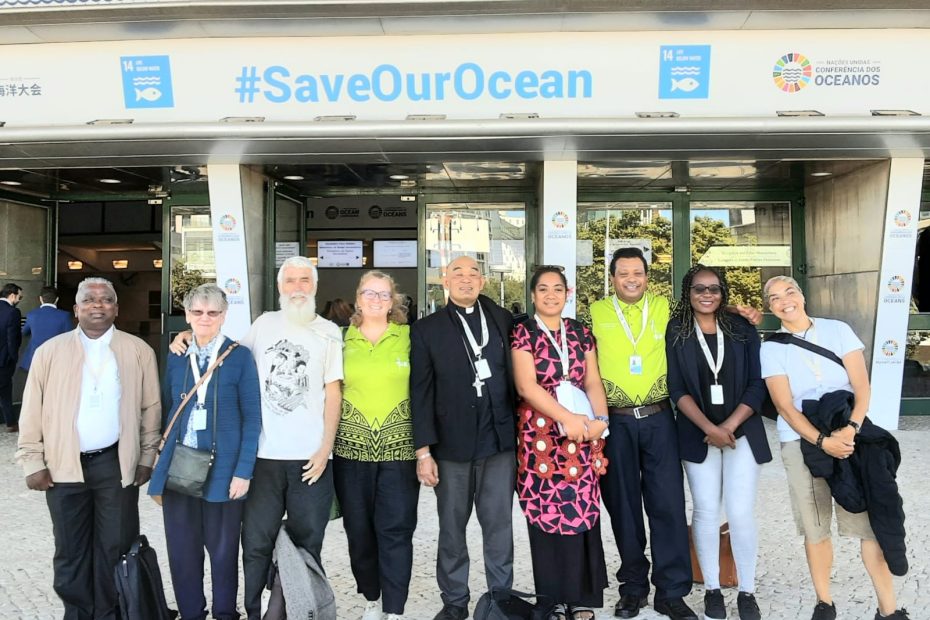The Oceania Asia Talanoa Faith Delegation to the 2022 UN Ocean Conference
Different groups affected by the changes in ocean climate, livelihoods and biodiversity loss started to exchange in March what group action and participation might be possible around the second UN Ocean Conference (UNOC), reflecting and acknowledging the conference objectives while sharing a deeper discernment of the human spirit and sense of community emerging, one that is calling for greater inclusion of vulnerable peoples and emphasizing again the urgency of the crisis.
Organizing themselves as the Oceania Asia Talanoa Faith Delegation, about 16 people gathered from 27 June to 1 July 2022 at the Altice Arena in Lisbon, Portugal and joined the UNOC sessions, daily Zoom meetings, as well as the group’s own parallel event to UNOC, the Oceania Talanoa: Faith, Indigenous, and Nature’s Moana Shaping and Safeguarding Innovations of the Sea. There were a further 18 online participants who also monitored the plenary and side events.
What is shared here is what the group learned in the process and a parallel report aligns some of the key documents that give a broader basis for continuing action.
Key advances from the Conference
UNOC’s overarching theme is Scaling up ocean action based on science and innovation for the implementation of SDG 14: Stocktaking, partnerships, and solutions. Eight interactive dialogues focused on seeking recommendations from stakeholders to upscale actions for SDG 14: Conserve and sustainably use the oceans, seas, and marine resources for sustainable development. There was much updating on the crisis, discussion of collaborative efforts, and the challenges of university-business interface.
State representatives, the academe, business interests, financial institutions, and civil society groups convened to face the ocean emergency. The UN noted there were 6,000 participants, though at any one time. attendance was way lower. The hope is to get greater action to protect the ocean and its biodiversity and to acknowledge the people who live there and their vulnerability to growing disasters.
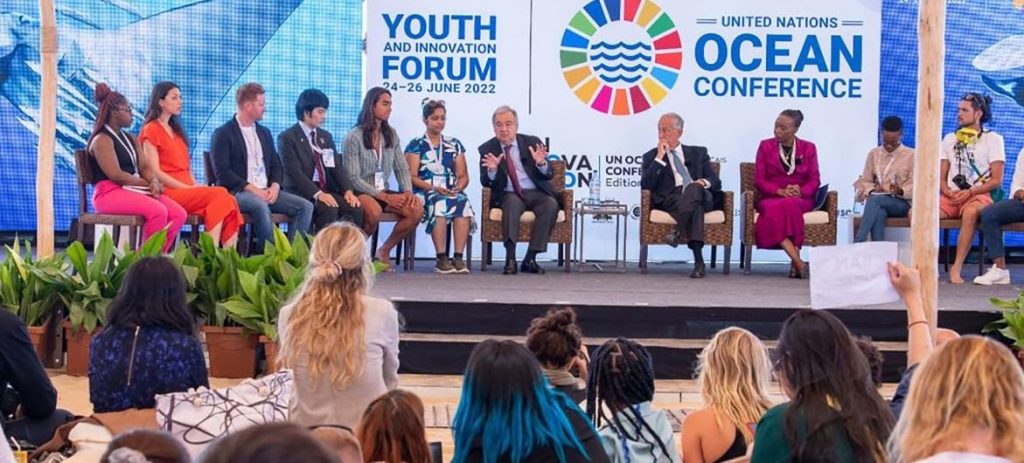
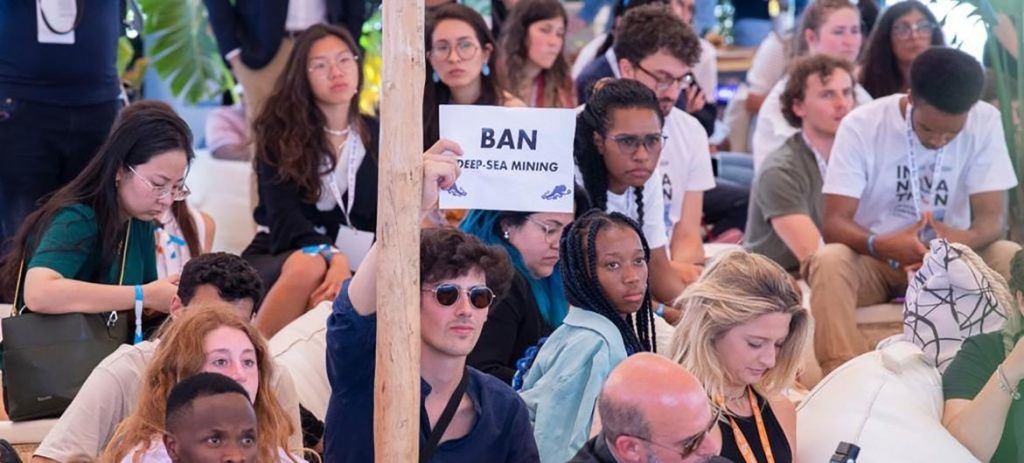
Throughout the course of the UNOC week, advances were made in the form of agreements, voluntary commitments, and pledges, most notably:
1. Fiji, Palau, and Samoa alliance against deep-sea mining
The governments of Fiji, Palau, and Samoa launched an alliance against deep-sea mining and backed the call for a moratorium, weeks before the International Seabed Authority (ISA) is set to lay out the regulations for the industry. Beyond the limitation of ISA that focuses solely on the seabed and does not include the columns of water and biodiversity above that are also affected, a further challenge is the lead Norway took in investing in deep-sea mining. Three other states are also positive towards deep-sea mining to support their economic growth and adaptation to climate change, as no funds are emerging from the Paris Agreement on loss and damage.
2. Launch of the Marine Science Declaration
The Alliance of Small Island Developing States (AOSIS) launched the Marine Science Declaration on 27 June 2022 titled Declaration for the enhancement of marine scientific knowledge, research capacity, and transfer of marine technology to Small Island Developing States. Small Island Developing States (SIDS) are also increasingly referred to as Large Ocean States.
3. Australia’s funding commitment to the Great Barrier Reef
Australia committed US$ 1.2 billion to protect and restore the Great Barrier Reef to tackle the symptoms and local damages but not the greater source of the long-term destruction which is the carbon and heat absorption by the oceans.
4. Adoption of a robust UN High Seas Treaty
Calls for the adoption of a robust UN High Seas Treaty are gaining momentum. A fifth round of negotiations with the UN Convention on the Law of the Sea is set on August 2022 in New York City, USA. This is perhaps the most immediate and attainable challenge for greater commitment.
5. Enabling local greater preparedness for Large Ocean States
Bilateral agreements ranging from research to adaptations involving Large Ocean States to enable greater preparedness at the local level are increasing and giving hope to many.
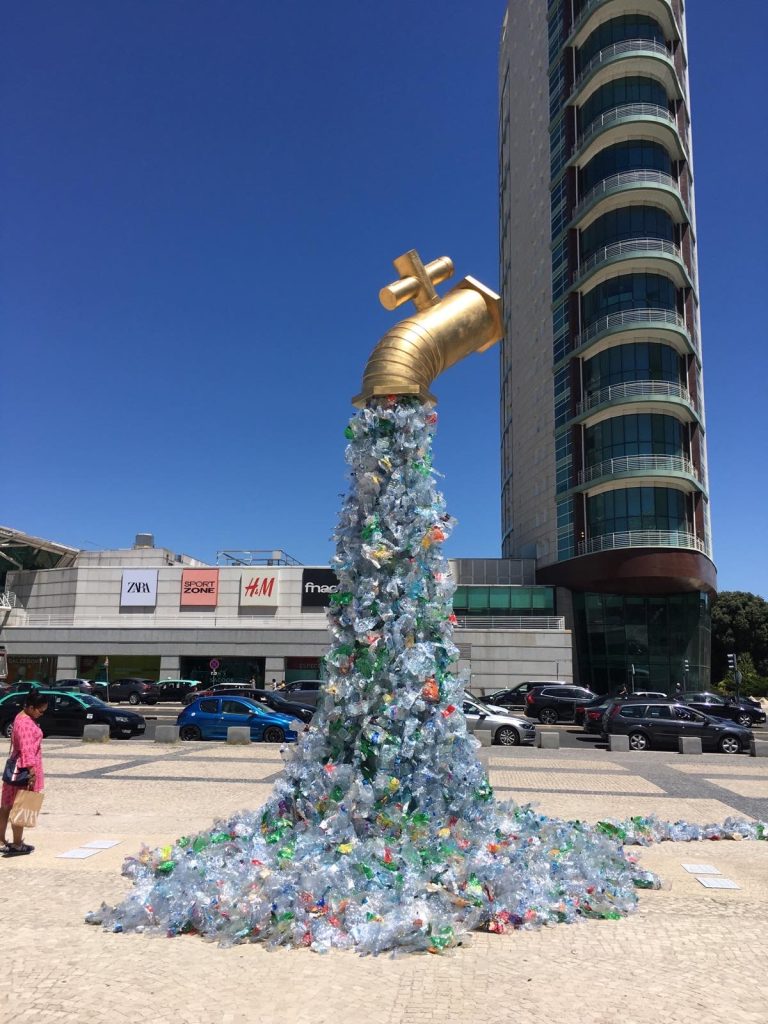
While encouraging and genuine, these steps forward are simply not enough compared to the gravity of threats that ocean states, coastal communities, and marine biodiversity face. In a global space where ocean states, youth, women, and Indigenous People should be strongly represented as holders of rights and stakeholders, this was not adequately met.
The proceedings mainly highlighted innovations and technological approaches while indigenous knowledge and practices were barely given recognition and support. Side events organized by RISE UP however did constantly highlight consultations and engagements with local communities.
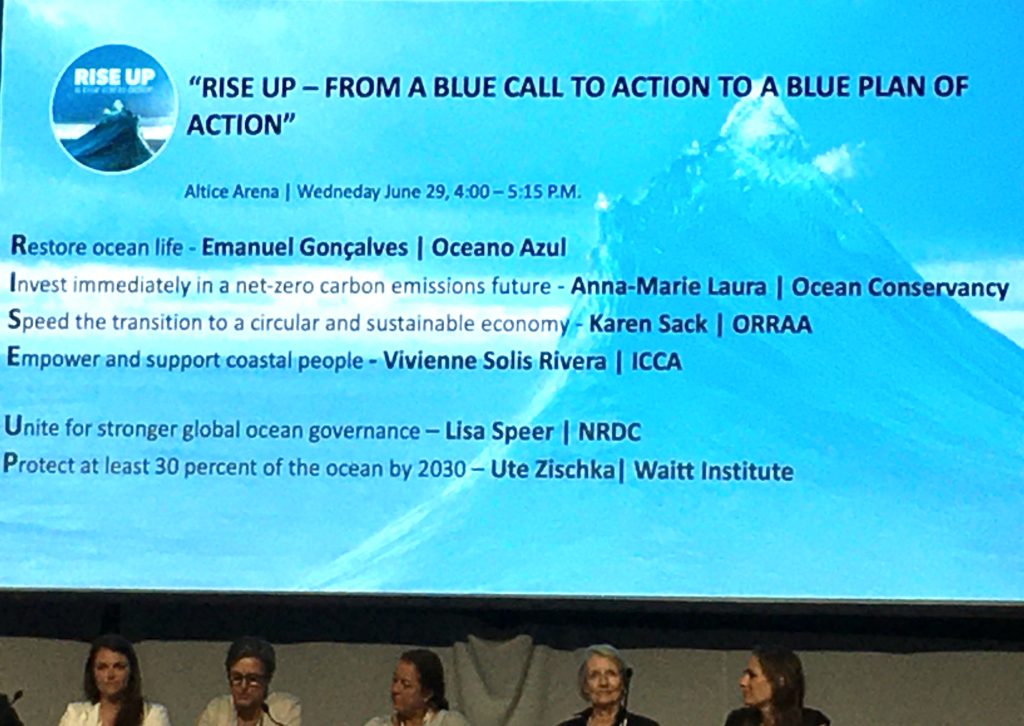
The Oceania Asia Talanoa Faith Delegation included indigenous knowledge practitioners and members of first nations from Oceania and civil society, faith leaders, and episcopal and faith network leaders who are all painfully aware of the plights of the oceans and the realities its inhabitants face. It is through the process of talanoa and synodality that the delegation sought to enter meaningful dialogue with other groups in Lisbon, to bring these concerns forward from a perspective of a sense of belonging to the ocean, faith reflection, and youthful aspirations that share the integrity of the voices from the oceans. These voices were poorly represented.
The cries and lamentations of the ocean and its inhabitants
“Change begins with the heart, and what we need is a language that reaches the heart. Spiritual and artistic language – indigenous wisdom, knowledge, and a language for God – has the power to bring about this change from within.” (Archbishop Peter Loy Chong of the Archdiocese of Suva and President of the Federation of Catholic Bishops’ Conferences of Oceania, during the Oceania Talanoa event on 28 June 2022)
For indigenous and local communities who lived by the oceans for millennia, the ocean is sacred; it is a living being that sustained their lives and livelihood for thousands of years. Their knowledge, practices, and traditions are deeply rooted on a relationship of mutual respect and care. Their spiritual connection with the ocean is an integral part of their cultural identity and integrity, and protecting it is an innate and shared responsibility. Yet, generations of injustices to their cultures and lives pushed them into a vulnerable context, aggravating their struggles to survive. As Charles Muang Cardinal Bo once shared in an event organized by the River above Asia Oceania Ecclesial Network (RAOEN), these people are “the wounded healers of the land and seas.”
The threats that plague the oceans due to extractive industries perpetuated by a profit-driven economy as well as a rapidly changing climate also threaten the very existence of indigenous and local communities and all life on Earth. The ocean which absorbs 90% of heat is a critical carbon sink and climate regulator, and as global temperatures continue to rise, weather patterns have become more volatile, affecting the lives and livelihood of all, and with local and indigenous communities bearing the brunt of its impacts. Understanding the shifts of the now extreme El Niño/La Niña fluctuations and “normal” rains and temperatures helps people understand the local farmer/fisher vulnerabilities better.
Each and every person is connected to the ocean, and this interconnection is something that needs to be taken into heart. “The ocean has tempers and feelings,” said Tevita Naikasowalu, the Justice, Peace, and Integrity of Creation (JPIC) Coordinator of the Columban Mission in Fiji. “If we listen to the ocean, we hear it speaking to us. The ocean has been holding us all throughout.”
Listening, learning, and doing
Beyond the national reporting the process that is heavily dominated by research findings and further investigations, technological innovations and commitments, there is nothing near the level of response needed for critical adaptations. For example, the energy alternatives needed to respond to greening the shipping industry (the equivalent of a major national economy being approximately 2.5% of the carbon generated annually) are not clear and are decades from being implemented.
Meanwhile, the youth, indigenous voices, women, and faith action groups need to shake up the status quo. These are the prophetic voices of people who are being challenged to survive, who are witnesses to the threats and challenges, and who have the heart and integrity to respond. It is through the process of talanoa and synodality that these voices are listened to and learned from, especially the voices of youth who are the agents of change and stakeholders of their future.
Malialosa Tapueluelu, Program Officer of Caritas Tonga and a youth delegate expressed the youth voice in a video reflection, “I personally believe that Laudato Si’, the call for care for Creation and our common home is our calling, our vocation as a young generation to be better stewards of this Earth.”
Bringing together science, business, and people
The socioecological crisis is rooted in a culture of consumerism and greed and perpetuates a vicious economic system that neglects the most vulnerable and Creation. This culture of ‘wanting more’ is what needs to change, and this first has to come from within.
The beauty of simplicity, humility, and ‘enough-ness’ can be learned from Indigenous Peoples who co-exist with the natural environment and with each other. It is this relationship of communal respect that sustains their existence. As stated by Tevita, “we need simplicity and we need to live more humbly. You don’t need much to gain more; you have to give more to gain much.”
There is a need for an ‘economy of justice’ and this is the challenge of the oikos where ecology and economy are integrated. There is a need to change the way we engage with science and economics by bringing people into the picture through an ethical discourse grounded on transparency and integrity. This is the shift that is needed in global dialogues, wherein the policies made, the strategies laid out, and the implementation mechanisms enacted, will genuinely be for the sake of all humanity and Creation.
A language that reaches the heart
How then can this change be brought about? The shifts needed are clear, but what will it take for world leaders, corporations, and policy and decision makers to listen?
Archbishop Peter Loy Chong emphasized how global processes are dominated by scientific and academic languages. As change begins with the heart, there is a need for a language that can touch the hearts of people and bring about change. This language is symbolic and artistic in nature, drawn from the spirituality, knowledge, and wisdom of Indigenous Peoples, and from the relationship with the Creator. It is this expression of faith and trust that can enable us to humbly acknowledge the changes needed from within.
This is the voice that all faiths have and there is a need to work together with other faiths to have a cohesive presence and voice in global discussions; a voice that invites others to listen. We all have a shared responsibility for caring for the oceans and all of Creation is also caring for humanity.
Learning from the UNOC and building a better process in engaging for greater climate action
The meeting was of great value in that it gave global importance to the grave damage being done to the oceans, people, biodiversity, and of course climate. It gives focus to SDG14 while connecting with the other SDGs and with the primary global crisis of the climate. It was a meeting of science and business. Government representatives are not policy makers and statements were generally weak and highly flawed.
Contradictions also emerged from the commitments. Australia’s commitment of US$ 1.2 billion to the Great Barrier Reef does not address the carbon/heat adsorption of the oceans unless the global reality is challenged. While Fiji, Palau, and Samoa banned deep-sea mining, these ocean states come from a history of extensive surface and coastal mining and as such, the extent of the commitment is not clear. Though granted in the past, the mining permits need to be reviewed if these are still legally binding. Other Large Ocean States are proceeding to do mining as the loss and damage payment mechanism affirmed in the Paris Agreement in COP21 never materialized.
While understanding the logic of the UN process, the “united nations” sometimes do not have the best interest of their people at stake. They may also feel taking the money from mining is the only way to match the disasters, past and future.
Engaging the West in establishing greater action now is essential. These are some of the reasons the voices of the people must be heard directly to give witness to the urgency of the suffering and call for greater urgency and transparency.
The value for the Oceania Asia Talanoa Faith Delegation, small as it is, was the learning as to how the UN operates in multiple ways and meeting such people as Dr Ian Fry, the first UN Special Rapporteur on the promotion and protection of human rights in the context of climate change.
What was also very important was sharing the values of faith reflection and positing the roles of the human spirit especially of the youth who contribute to both creativity of culture and community actions. Sadly, these are so far unaccounted in the process and what needs to be followed through in building a better process.
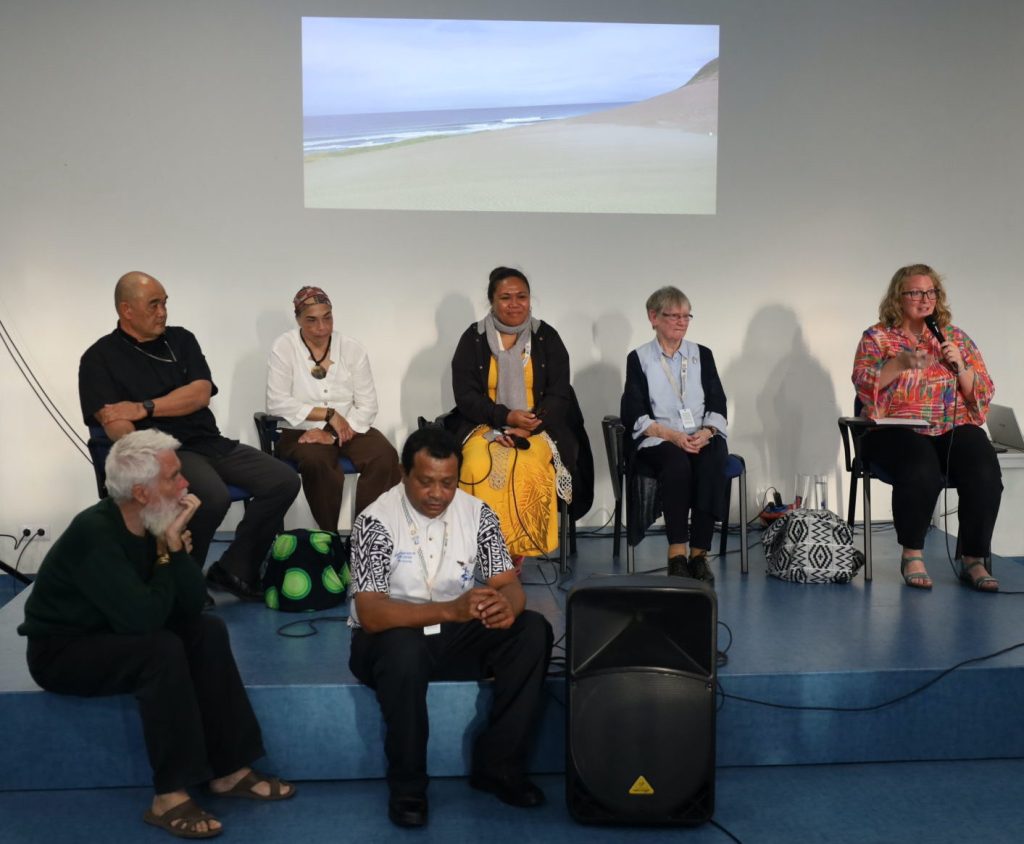
The next UN climate change conferences and the presidencies of the Conference of the Parties (COP) will be held in regions that may consider the oceans peripheral to the urgency of climate action – COP27 in Egypt in November 2024, COP28 in the United Arab Emirates in November 2023, while COP29 in November 2024 is scheduled to be held in the Eastern European states.
With all these reflections these days, of pestilence and war, of indentured poverty, we are forced anew to be humble as humans. Our trust is in the Lord (who built heaven and earth) and we must be ready with open hearts to go through hell and high water for the love of God, in present times and in the future, placing our trust solely in God to have the hope that is much needed.
Learn more about their engagements here.
#OceaniaTalanoa2022 is a collaboration of the Archdiocese of Port Moresby, Archdiocese of Suva, Australian Catholic University, Caritas Internationalis, Caritas Oceania, Caritas Portugal, Caritas Tonga, Civil Society Forum of Tonga, Columban Missionaries, Columban Mission Society Fiji, Congregation of the Daughters of Our Lady of the Sacred Heart, Ecojesuit-Global Ignatian Advocacy Network, Environmental Science for Social Change-Philippines, Federation of Catholic Bishops’ Conferences of Oceania, Gweagal Cultural Connections, Institute of Sisters of Mercy of Australia and Papua New Guinea, Jesuit Conference of South Asia, Laudato Si’ Movement, Pontifical Gregorian University, River above Asia Oceania Ecclesial Network, Society of Divine Word Missionaries, Vatican Covid-19 Commission, and Yarra Theological Union of the University of Divinity.
